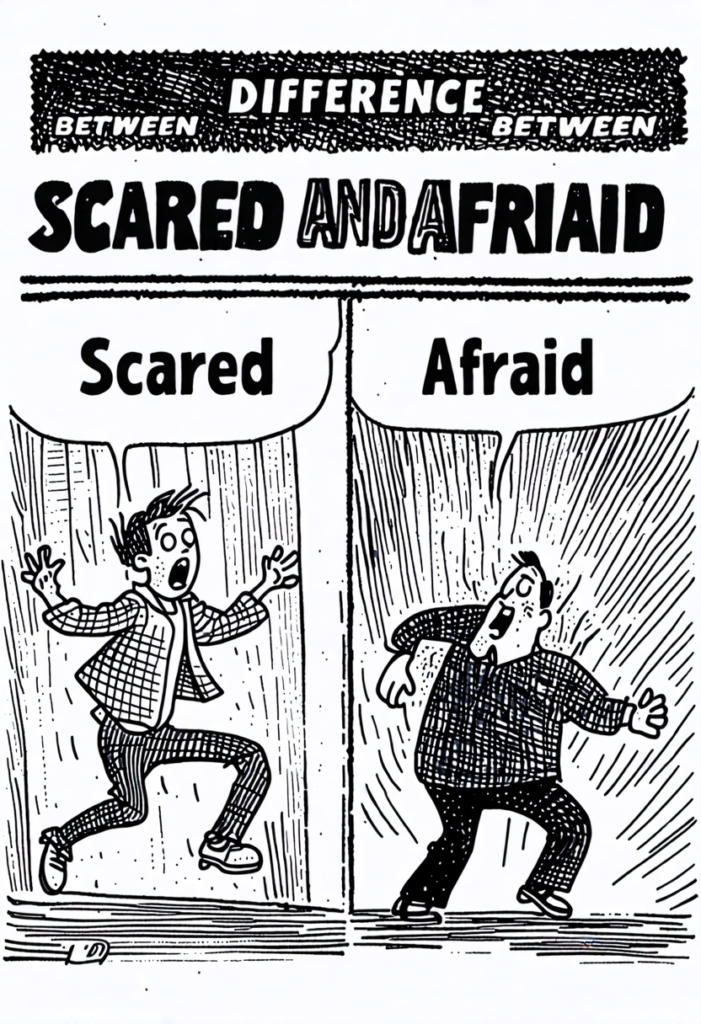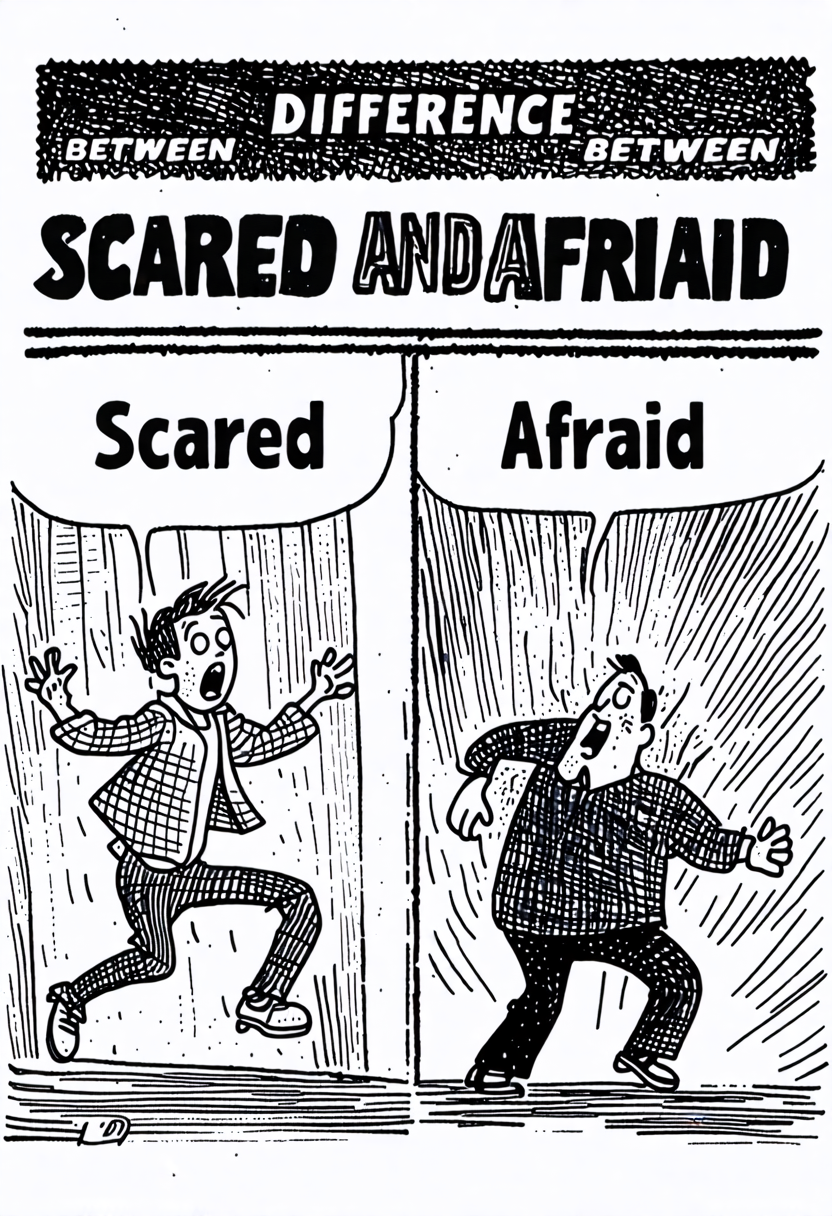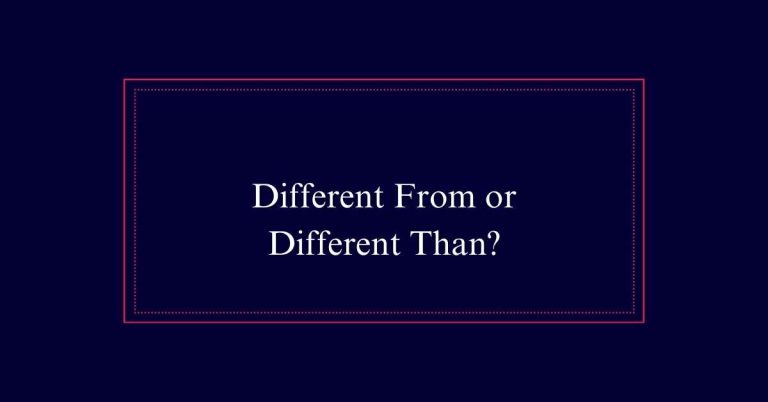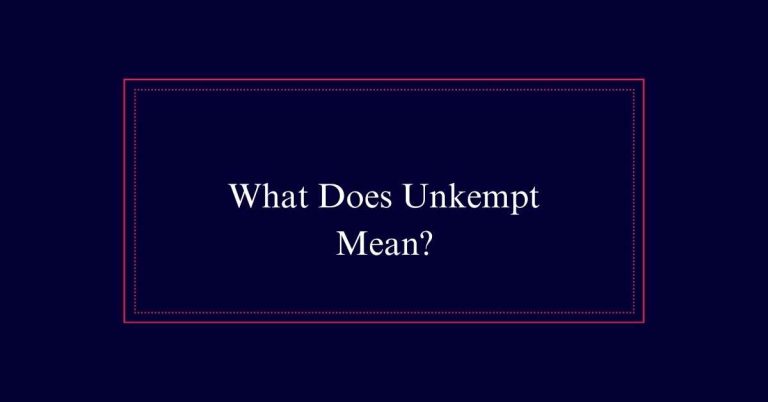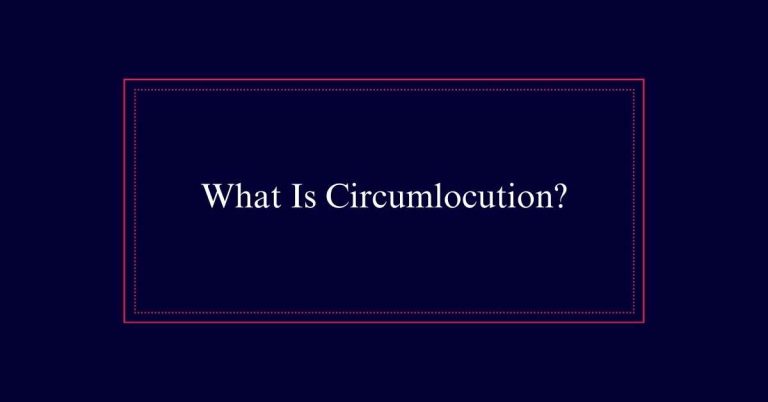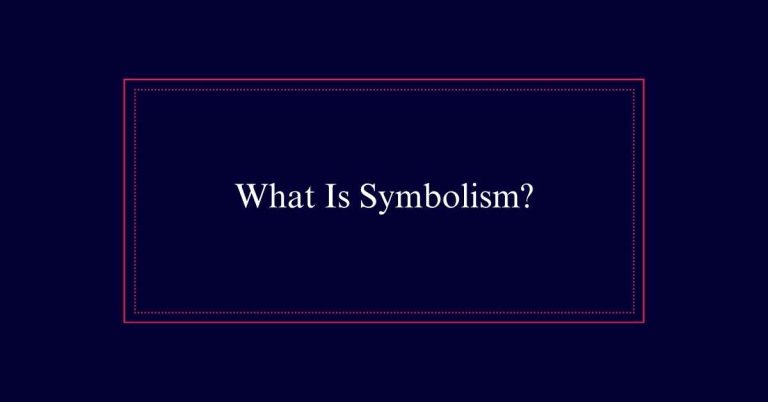What is the Difference Between Scared and Afraid?
‘Scared’ and ‘afraid’ both describe feelings of fear, but they have different connotations. ‘Scared’ often refers to an immediate, visceral reaction to something frightening, usually followed by prepositions like ‘of’ or ‘by.’ This can trigger physical responses such as sweating or trembling. ‘Afraid,’ on the other hand, denotes a more general, enduring sense of fear or apprehension, often linked to worry or anxiety. It is typically used after the verb ‘to be.’
Scared Vs. Afraid
Fear manifests in various forms, with ‘scared’ and ‘afraid’ being two commonly used terms to describe it. Both words relate to feelings of fear, yet they are not entirely interchangeable. ‘Afraid’ signifies a general sense of fear or apprehension. It can also mean feeling regret or reluctance about something.
‘Scared’ specifically denotes being in a state of fear, nervousness, or panic. Additionally, ‘scared’ often follows a preposition, while ‘afraid’ usually appears directly after the noun it describes.
Understanding these subtle differences is essential for accurate communication. While both terms deal with fear, their grammatical usage and specific connotations distinguish them, helping to convey more precise emotions and states of mind in various contexts.
Emotional Nuances
The emotional nuances between ‘scared’ and ‘afraid’ reveal deeper layers of fear and apprehension. Although both words describe fear, they evoke different emotional responses.
Scared often suggests an immediate, visceral reaction. It’s the feeling when startled by a sudden noise.
Afraid can imply a more enduring sense of dread. It often involves worry about potential future events.
Scared might trigger physical responses like a racing heart or sweating.
Afraid can lead to mental states such as anxiety or unease.
Contextual Usage
Understanding the contextual usage of ‘scared’ and ‘afraid’ is essential for accurate communication.
‘Scared’ is often used in situations where immediate fear or panic is felt. For example, ‘She was scared when she heard the loud noise.’ It is also commonly followed by a preposition, such as ‘scared of’ or ‘scared by.’
On the other hand, ‘afraid’ is more versatile. It can express fear, but also regret or reluctance. For example, ‘He is afraid of spiders’ and ‘I am afraid I cannot attend.’ ‘Afraid’ is typically placed after the noun it describes and does not require a preposition.
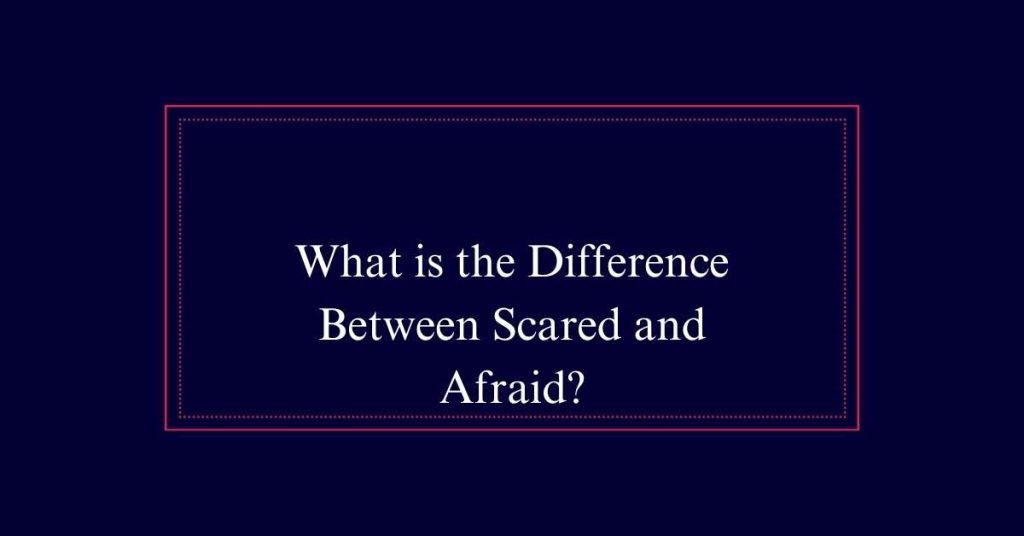
Common Confusions
Many people often confuse ‘scared’ and ‘afraid’ due to their overlapping meanings and contexts. Both words deal with fear, yet their nuances often lead to mix-ups.
To clarify these common confusions, consider the following scenarios:
- Feeling Fear: When you sense danger, both ‘scared’ and ‘afraid’ are appropriate.
- Regret or Reluctance: ‘Afraid’ can also express regret, as in ‘I’m afraid I can’t join you.’
- Intensity of Fear: ‘Scared’ often implies a higher level of immediate panic or nervousness.
- Confirmation of Bad News: ‘Afraid’ is frequently used to confirm unfortunate information, such as ‘I’m afraid the event is canceled.
Grammar Differences
Differentiating between ‘scared’ and ‘afraid’ involves understanding their distinct grammatical usages. ‘Scared’ often follows a preposition, like ‘of’ or ‘by.’ For example, one might say, ‘She is scared of spiders.’ It can also be used as a past participle, such as ‘He was scared by the noise.’
In contrast, ‘afraid’ is mainly used as a predicate adjective, appearing after the verb ‘to be.’ For instance, ‘She is afraid.’ ‘Afraid’ also fits naturally after the noun it describes, such as ‘The child is afraid.’ Unlike ‘scared,’ ‘afraid’ does not typically follow a preposition.
Literary Examples
Literary works often illustrate the nuanced differences between ‘scared’ and ‘afraid.’ For example, in Jack Kerouac’s ‘On the Road,’ the character states, ‘I wasn’t scared; I was just somebody else.’ This shows a state of detachment rather than pure fear.
In contrast, Natalie Babbitt’s ‘Tuck Everlasting’ advises, ‘Don’t be afraid of death; be afraid of an unlived life.’ Here, ‘afraid’ conveys a deeper existential concern. Such distinctions can evoke strong emotions:
- Fear of the unknown: Characters express feelings of being scared in uncertain situations.
- Existential dread: Afraid captures the fear of wasted potential.
- Immediate danger: Scared often relates to physical threats.
- Emotional reluctance: Afraid can indicate hesitation or regret.
Synonyms and Alternatives
Synonyms for ‘scared’ and ‘afraid’ offer various shades of meaning, enriching our expression of fear. For instance, ‘frightened’ conveys a sense of being alarmed or anxious.
‘Terrified’ indicates an extreme level of fear, often paralyzing.
‘Spooked’ suggests sudden fear, often causing a startled reaction. These alternatives help us describe fear more accurately in different situations.
‘Petrified’ emphasizes being so scared that one cannot move.
‘Horrified’ denotes a mix of fear and shock. Using these synonyms can better capture the intensity and nuances of fear in speech and writing. Understanding these options ensures precise communication, helping to convey the exact level and type of fear experienced.
Positioning in Sentences
Understanding the correct positioning of ‘scared’ and ‘afraid’ in sentences is essential for proper grammar and clear communication.
‘Scared’ often follows a verb and is typically used with prepositions. For example, ‘She is scared of spiders.’
Conversely, ‘afraid’ is more restricted in its placement and sounds more natural after the noun it describes. For instance, ‘He is afraid to speak.’
Consider these points:
- ‘The child was scared by the noise.’
- ‘She felt scared when alone.’
- ‘He is afraid of heights.’
- ‘We are afraid to fail.’
Expressing Regret or Reluctance
In addition to expressing fear, the word ‘afraid’ can also convey feelings of regret or reluctance. This usage is different from ‘scared,’ which solely denotes fear.
For example, one might say, ‘I’m afraid I can’t attend the meeting,’ to express regret over being unavailable. Similarly, ‘I’m afraid to try skydiving’ indicates reluctance rather than sheer fear.
These nuances are essential for accurate communication. Understanding the dual function of ‘afraid’ helps in conveying more complex emotions. It allows the speaker to express not just fear but also hesitation or sorrow over an unfortunate situation.
Practical Usage Tips
When choosing between ‘scared’ and ‘afraid,’ consider the context to make sure correct usage. Here are some practical tips:
- Scared: Use ‘scared’ when describing a temporary state of fear or nervousness. For example, ‘I was scared during the thunderstorm.’
- Afraid: Use ‘afraid’ to express a general feeling of fear or apprehension. For instance, ‘She is afraid of heights.’
- Grammar: ‘Scared’ often follows a preposition like ‘of’ or ‘by.’ Example: ‘He is scared of spiders.’
- Positioning: ‘Afraid’ typically follows the noun it describes, such as in ‘I am afraid that we are lost.’
Frequently Asked Questions
Can Scared and Afraid Be Used Interchangeably in Professional Writing?
Scared and afraid are not always interchangeable in professional writing. “Afraid” often conveys apprehension or regret, while “scared” implies immediate fear. Proper usage depends on the context and grammatical structure of the sentence.
Are There Any Idiomatic Expressions Using Scared or Afraid?
Yes, there are idiomatic expressions using scared or afraid. Examples include “scared stiff,” meaning extremely frightened, and “afraid of one’s own shadow,” describing someone very timid. These phrases emphasize different levels of fear.
How Do Scared and Afraid Translate Into Other Languages?
Scared and afraid often translate differently in other languages. For example, in Spanish, “scared” is “asustado,” and “afraid” is “temeroso.” Each language has unique words and nuances to express different levels of fear.
What Are Historical Origins of Scared and Afraid?
The word “scared” originates from Old Norse “skirra,” meaning to frighten. “Afraid” comes from the Old English “afǣran,” meaning to terrify. Both terms evolved to describe states of fear and apprehension in modern English.
